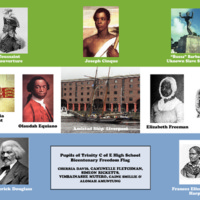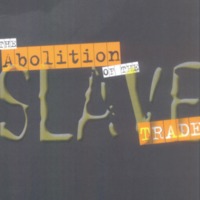
Bicentenary Freedom Flag
The Bicentenary Freedom Flag was displayed alongside an exhibition about Wartime Black History at Manchester Town Hall. The project was a collaboration between staff from Manchester City Council Corporate Services Black Staff Group and pupils of Trinity Church of England School in Manchester. The flag recognised the work, struggles and sacrifices of those who brought the slave trade to an end, and featured images of prominent individuals on the background of the Sierra Leone flag. Those featured on the flag included Toussaint L'Ouverture (General of the Haitian Uprising), the abolitionist Olaudah Equiano, the anti-slavery orator Frederick Douglass, the statue in Barbados of 'Bussa', the unknown slave, guide of the Underground Railroad Harriet Tubman, and Joseph Cinque, leader of the Amistad slave ship revolt. The accompanying exhibition included pupils' articles and creative writing. It also examined the history and role of the West India Regiments, British colonial infantry regiments largely recruited amongst freed slaves from North America and slaves purchased in the West Indies.

The Abolition of the Slave Trade
Kirklees Council ran a range of events in 2007, focused on local connections with slavery and abolition. Kirklees Civic Sunday was the official commemoration at Huddersfield Parish Church, with a performance by a local gospel choir and a presentation by actors as historical characters. The links between Yorkshire and the Caribbean were also explored: 8,500 people of African-Caribbean descent live in the borough of Kirklees. Events such as the Jamaica National Independence Cultural Festival, Deighton Carnival and Huddersfield Carnival celebrated African and Caribbean culture. Part of the Kirklees programme was to host the Equiano Project's touring exhibition at the Hudawi Centre in Huddersfield. The Centre went on to name one of its rooms after Equiano. Other events included talks from historians, including Richard Reddie and Paul Crooke, church services, choir concerts and theatre productions.